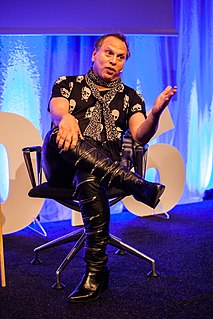A Quote by Brian Wilson
I think in terms of emotions. And feelings. So sometimes what I say may not always be clear. But creatively, there's a lot to be said for that way of thinking.
Related Quotes
Clear mind is like the full moon in the sky. Sometimes clouds come and cover it, but the moon is always behind them. Clouds go away, then the moon shines brightly. So don't worry about clear mind: it is always there. When thinking comes, behind it is clear mind. When thinking goes, there is only clear mind. Thinking comes and goes, comes and goes, You must not be attached to the coming or the going.
I always try to say what I'm thinking, what I'm feeling, and without fear of what others will say or think, and that's how I've always lived. Sometimes, this has ended up hurting me, and other times, it has helped me, but I think you can never forget who you are, and I've always been myself, and that one of the things I'm most proud of.
I knew very little about Rugby. But, I think it helps in terms of an American audience the game is enough like football in that it's a battle for field position and you score by running into what looks a lot like an end zone. I think in terms the nuance of the game, Americans won't get that stuff. I think in terms of the peanut butter and jelly version of what you need to know, I think it's pretty clear.
We're at a time now where there's a lot more "I'll do whatever it takes" attitude. I'm not going to say or do what you want me to say or do just because it might help me or be the politically correct thing to do to help my career. And that may have hurt me sometimes. I think about different collaborations that have been brought my way - it might have meant I'd get to be on TV to do certain things, but I've said, "No. It doesn't make sense. I'm not doing it." And other people might jump at the opportunity.
The strange thing about the apocalypse is that it's uneven. For some people, it goes one way and for others another way, so that there's always this shifting relation to the narrative of the disaster. Sometimes apocalypses are just structural fictions, and sometimes they're real. Sometimes a narrative requires an end - the fact that the beginning was always leading somewhere becomes clear at the end. There's an idea that we're always in the middle, but we posit this apocalyptic end in order to also be able to project into the past or the beginning. I think that's true and false.
As a writer, you're always trying to say the best thing. You're always thinking about what's the best thing to say, and what's the hardest way to say it, and what's the best line? Sometimes the best line is the simplest line. Sometimes the best line is the line that evokes more feeling than actual wordsmithing.
The mechanism of primary emotions does not describe the full range of emotional behaviors. They are, to be sure, the basic mechanism. However, I believe that in terms of an individual's development they are followed by mechanisms of secondary emotions, which occur once we begin experiencing feelings and forming systematic connections between categories of objects and situations, on the one hand, and primary emotions, on the other.




































